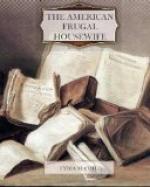VARNISHED FURNITURE.—If you wish to give a fine soft polish to varnished furniture, and remove any slight imperfections, rub it once or twice a week with pulverized rotten-stone and linseed oil, and afterward wipe clean with a soft silk rag.
CREAM.—The quantity of cream on milk may be greatly increased by the following process: Have two pans ready in boiling hot water, and when the new milk is brought in, put it into one of these hot pans and cover it with the other. The quality as well as the thickness of the cream is improved.
TEETH.—Honey mixed with pure pulverized charcoal is said to be excellent to cleanse the teeth, and make them white. Lime-water with a little Peruvian bark is very good to be occasionally used by those who have defective teeth, or an offensive breath.
TAINTED BUTTER.—Some good cooks say that bad butter may be purified in the following manner: Melt and skim it, then put into it a piece of well-toasted bread; in a few minutes the butter will lose its offensive taste and smell; the bread will absorb it all. Slices of potato fried in rancid lard will in a great measure absorb the unpleasant taste.
TOMATOES PIE.—Tomatoes make excellent pies. Skins taken off with scalding water, stewed twenty minutes or more, salted, prepared the same as rich squash pies, only an egg or two more.
It is a great improvement to the flavor of PUMPKIN PIES to boil the milk, stir the sifted pumpkin into it, and let them boil up together once or twice. The pumpkin swells almost as much as Indian meal, and of course absorbs more milk than when stirred together cold; but the taste of the pie is much improved.
Some people cut pumpkin, string it, and dry it like apples. It is a much better way to boil and sift the pumpkin, then spread it out thin in tin plates, and dry hard in a warm oven. It will keep good all the year round, and a little piece boiled up in milk will make a batch of pies.
Most people think BRASS KETTLES for washing are not as likely to collect verdigris, if they are never cleaned in any other way than by washing in strong soap suds just before they are used.
INK SPOTS.—If soaked in warm milk before the ink has a chance to dry, the spot may usually be removed. If it has dried in, rub table-salt upon it, and drop lemon-juice upon the salt. This answers nearly as well as the salts of lemon sold by apothecaries. If a lemon cannot be easily procured, vinegar, or sorrel-juice, will answer. White soap diluted with vinegar is likewise a good thing to take out ink spots.
STARCH.—Frozen potatoes yield more flour for starch than fresh ones. The frost may be taken out by soaking them in cold water a few hours before cooking; if frozen very hard, it may be useful to throw a little saltpetre into the water.
FEATHERS.—It is said that tumbled plumes may be restored to elasticity and beauty by dipping them in hot water, then shaking and drying them.




